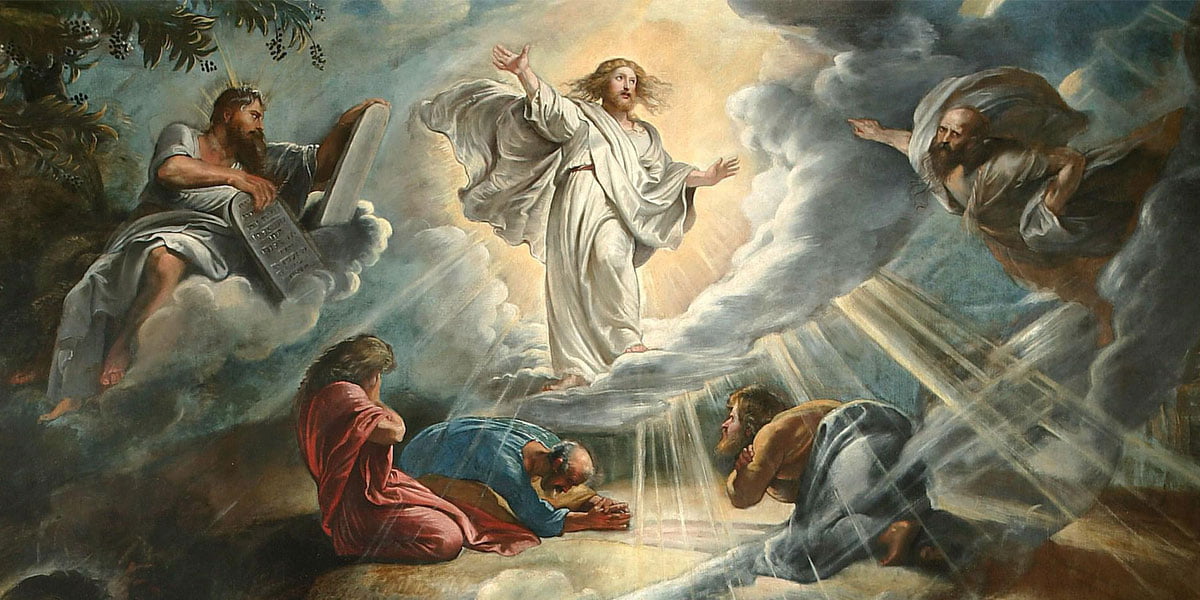Matthew 17:1-13
 Six days later, Jesus took with him Peter and James and his brother John and led them up a high mountain, by themselves. And he was transfigured before them, and his face shone like the sun, and his clothes became dazzling white. Suddenly there appeared to them Moses and Elijah, talking with him. Then Peter said to Jesus, “Lord, it is good for us to be here; if you wish, I will make three dwellings here, one for you, one for Moses, and one for Elijah.” While he was still speaking, suddenly a bright cloud overshadowed them, and from the cloud a voice said, “This is my Son, the Beloved; with him I am well pleased; listen to him!” When the disciples heard this, they fell to the ground and were overcome by fear. But Jesus came and touched them, saying, “Get up and do not be afraid.” And when they looked up, they saw no one except Jesus himself alone.
Six days later, Jesus took with him Peter and James and his brother John and led them up a high mountain, by themselves. And he was transfigured before them, and his face shone like the sun, and his clothes became dazzling white. Suddenly there appeared to them Moses and Elijah, talking with him. Then Peter said to Jesus, “Lord, it is good for us to be here; if you wish, I will make three dwellings here, one for you, one for Moses, and one for Elijah.” While he was still speaking, suddenly a bright cloud overshadowed them, and from the cloud a voice said, “This is my Son, the Beloved; with him I am well pleased; listen to him!” When the disciples heard this, they fell to the ground and were overcome by fear. But Jesus came and touched them, saying, “Get up and do not be afraid.” And when they looked up, they saw no one except Jesus himself alone.As they were coming down the mountain, Jesus ordered them, “Tell no one about the vision until after the Son of Man has been raised from the dead.” And the disciples asked him, “Why, then, do the scribes say that Elijah must come first?” He replied, “Elijah is indeed coming and will restore all things; but I tell you that Elijah has already come, and they did not recognize him, but they did to him whatever they pleased. So also the Son of Man is about to suffer at their hands.” Then the disciples understood that he was speaking to them about John the Baptist.
Mountains and Valleys
I think you could call the passage we just read the ultimate mountaintop experience. I mean, who could ask for more than to witness what Peter, James and John experienced: the metamorphosis of Jesus, the sudden appearance of Moses and Elijah, and then the capper, the voice of heaven identifying Jesus as the beloved Son of God. Now, I’ve been to many youth camps, the place where mountaintop experiences are not only common but expected. But Camp Olivet can’t compare with the Transfiguration. And yet, as they were coming down the mountain, Jesus ordered them to “tell no one about the vision until after the Son of Man has been raised from the dead.”
And even though this may seem confusing from a PR perspective, I think it makes good sense. You see, we visit mountaintops; we live in the valleys below. And for that reason, a faith grounded in emotional highs may not offer much help or support when life is challenging. As a matter of fact, we can actually spend our entire lives trying to recreate the very thing that represents escape rather than help. And maybe that’s the reason that the cross and the empty tomb are so important for Christians, because the first represents real-life pain and the another real world hope. And so, although it may be tempting, let’s not focus so much on finding the mountain that we forgive to live in the valley.




No comments:
Post a Comment